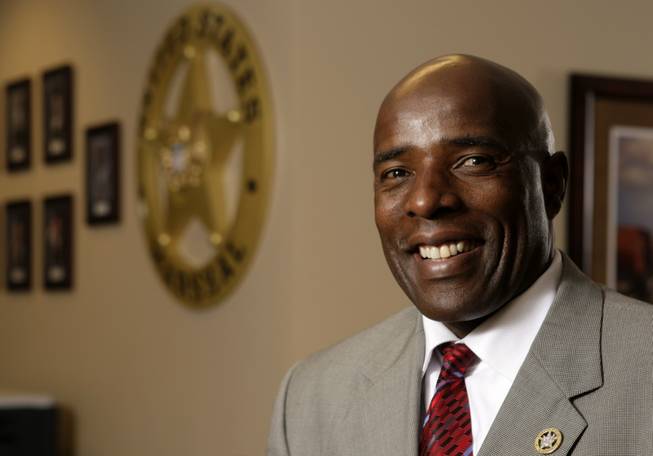
Mona Shield Payne
Nevada U.S. Marshal Christopher Hoye is a former Metro Police lieutenant. He was appointed by President Barack Obama and sworn into his new position in April.
Friday, June 4, 2010 | 2 a.m.
Nevada’s new U.S. marshal, Christopher Hoye, is a native Las Vegan and was a decorated Metro Police lieutenant. Appointed to his new job by President Barack Obama, Hoye started April 19, after he was confirmed by the Senate.
What was it like to go through the confirmation process?
I would imagine for a man it’s about as close to giving birth as we’ll ever experience. It lasted the better part of 14 months. You go through background checks that are so thorough they interview people you went to grade school with. They left no stone unturned.
How will your background with Metro help you as U.S. marshal?
What I learned at Metro was how to handle critical incidents, dynamic incidents with a degree of calm, confidence and competency. Lieutenants and above have to go before the sheriff and command staff and are responsible for crime trends in their area. Our sheriff and undersheriff are tough guys and they ask difficult questions. So you have to be prepared to answer questions at times that don’t have easy answers. They have pretty good BS detectors.
What plans are you working on for the Marshals Service in Nevada?
In the next 60 days I’ll be bringing in a new chief deputy and will look at creating more office space for our deputies. I would also like to build a stronger management team. We have groups that work independently and they do outstanding work, but I want to bring them together as a team. It’s absolutely vital that they all know what one another does.
Because your office apprehends fugitives, have you noticed any recent trends with regard to the types of fugitives being sought by law enforcement agencies?
From a police officer’s standpoint, I began seeing a larger number of females committing crimes, which was shocking. We saw a large number of young females from maybe the ages of 15 to 22 engage in violent crimes, street-level robberies. There were drug rips, where females were ripping off other drug dealers. There was a time when most people believed that the only crime associated with women was prostitution, but even that has become more sophisticated, with women introducing drugs to their clientele to commit robberies.
Has your office made any changes in courthouse security as a result of the courthouse shooting Jan. 4 that killed a security guard and wounded a deputy marshal?
Absolutely. The best security you’ll ever know is typically the security you never see. The U.S. Marshals Service put new security measures into place immediately after that tragic incident. What I can speak to is an increase in patrols, not only by our uniformed deputies but also by court security personnel. Areas of our courthouse have been hardened. These are things that the general public will not see.
In some jurisdictions, judges take their handguns into their courthouses. What do you think about that?
That is a very sensitive topic. I have had the great pleasure of meeting our judges and they run the entire gamut. There are those who are literally cops. They know more about guns and police tactics than the average, young two-year officer. I would have no problem with them carrying a gun. And then there are others who are basically men of letters. They love books, they love the law, but they would literally run from a gun. But I’m not sure I’m at liberty to tell a lifetime-appointed judge what they could or could not do. That’s way above my pay grade.

Join the Discussion:
Check this out for a full explanation of our conversion to the LiveFyre commenting system and instructions on how to sign up for an account.
Full comments policy